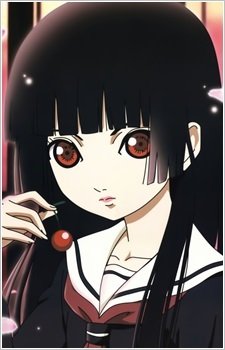Series & First Appearance
Ai Enma is the primary protagonist of the anime and manga series "Hell Girl" (Jigoku Shoujo), created by Takemoto Nnko. She first appeared in the anime adaptation’s premiere episode, "The Girl from Hell," which aired on October 4, 2005. The series was produced by Studio DEEN, known for its compelling storytelling and character development.
Profile at a Glance
Ai Enma is depicted as a strikingly beautiful girl with long, flowing black hair and red eyes, typically appearing in her late teens, although her true age is over 400 years due to her spiritual nature. As the series’ protagonist, Ai serves as a vengeful spirit delivering justice for those seeking retribution against wrongdoers, operating alongside her grandmother in a realm of eternal twilight. Signature abilities include energy blasts, illusion creation, and teleportation, particularly when driven by her rage.
Personality & Motivations
At first glance, Ai Enma may appear emotionless and detached, as years of completing her tasks have numbed her feelings. However, her complex character reveals moments of vulnerability beneath her stoic exterior. Ai’s primary motivation is rooted in her tragic past and the quest for atonement; she seeks to fulfill the wishes of her clients to alleviate her own torment. Despite her subdued demeanor, Ai has shown glimpses of emotion and empathy, particularly through her interactions with the Shibatas, which serve to reignite her suppressed feelings. Her catchphrase often embodies the gravity of fate: "Those who are cursed must find a way to atone."
Abilities / Powers
Ai Enma possesses a diverse array of powers, largely stemming from her role as Hell Girl. Notable abilities include:
- Energy Manipulation: When enraged, Ai can unleash destructive blasts of energy that can devastate her opponents.
- Illusions: She can conjure intricate illusions, providing psychological torment to those she confronts.
- Teleportation: Ai can move between realms, swiftly transporting herself and others.
Despite these formidable abilities, her powers are linked to her emotional state. The long history of her tasks has conditioned her to suppress her emotions, which restricts her powers. Throughout the series, as Ai confronts her own feelings, her ability to wield her powers evolves, often manifesting as increased intensity or creativity in their use.
Major Story Arcs & Growth
Ai’s story arcs are entwined with her journey of dealing with resentment and loss. Key turning points include:
-
Origins: The tragic event leading to Ai’s transformation into Hell Girl—betrayed by her village and buried alive—exemplifies her motivations for vengeance and the pain she endures.
-
Interacting with the Shibatas: The introduction of the Shibata family reawakens Ai’s buried emotions. Their struggles mirror her own, prompting Ai to confront her feelings and motivations, raising questions about her role as a harbinger of vengeance.
- Search for Freedom: As the series progresses, the theme of Ai seeking liberation from her eternal punishment and the search for closure becomes more prominent, marking significant character growth.
Notable Relationships
Ai’s relationships significantly impact her narrative:
-
Wanyūdō: A key ally and confidant, Wanyūdō shares a deep understanding of Ai’s character and assists her in her tasks, often providing wisdom when she feels lost.
-
Sentaro: Ai’s childhood soulmate, whose betrayal catalyzes her tragic backstory. His memory significantly influences her emotions and decisions throughout the series.
- Her Grandmother: An important figure in Ai’s life, providing guidance and wisdom while underscoring the generational aspect of their roles in the cycle of vengeance.
Iconic Moments & Quotes
One of Ai’s most memorable moments occurs in Episode 9, "The Box," where she confronts a woman seeking vengeance for her daughter’s death. In this encounter, Ai’s emotional struggle can be felt, capturing the audience’s attention as they see her grapple with the implications of her actions. Her chilling line, "In this world, there are no happy endings," echoes as a poignant reminder of the series’ overarching themes of suffering and retribution.
Trivia & Behind-the-Scenes
-
Voice Actors: In the Japanese version, Ai Enma is voiced by Hnamako Ryou, while the English counterpart features Caitlin Glass. Both actresses have been praised for their ability to convey Ai’s complex emotional range.
-
Cultural Symbolism: Ai’s name carries dual meanings; “Ai” can mean both “love” and “accomplice,” highlighting the irony of her role as both punisher and observer.
- Popularity: Ai Enma has garnered a significant fanbase, ranking in the top tier of character popularity polls, with 3,443 member favorites noted, reflecting her strong impact on audiences.
Through layered storytelling and nuanced character development, Ai Enma stands out as an iconic and tragic figure within the landscape of anime, symbolizing the complexities of vengeance and the quest for emotional freedom.







